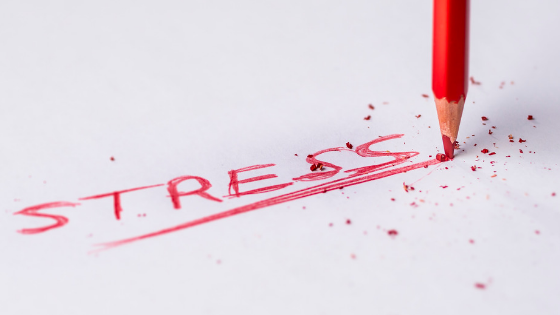|
I was cautioned last week by two people I respect and admire. Both had suggested I needed to be mindful of how much stress I was under. I didn’t think I was stressed… maybe I am? Maybe I’m giving off stressful vibes? Not a good look if you’re a coach! I asked The Husband if he thought I was stressed:
“Nowhere near as stressed as you have been in the past, work used to be a major trigger, now not so much. Now it's more people you love and care about being in trouble... anyway you function better when there are stressful situations - it’s how you roll." This came, as somewhat of a revelation. I hadn’t really ever thought about how I function when I’m under stress. I wasn’t exactly averse to the idea that I was “good” under stress - we all like a little affirmation of our skills and abilities. But, should I see that as an attribute? And more to the point why did I think being GOOD while under stress was a good thing, when everyone else seemed to think it wasn’t good to be stressed. I’m not suggesting the husband is the oracle of all things personal about Sian... but after 30 years of marriage, it’s probably safe to say, he has some insight! Like most of us, I know there have been times in my life when things were tough. And I know I get a little, how should I say this… snappy if people and things don’t move quite at the pace I see fit. However, actually being stressed constantly isn’t how I ever saw myself. So after my measured 1 hr research (keep it within a time limit or I get seriously over whelmed with Google) I found an amazing website www.stress.org.uk. What I Learned It isn’t a bad thing to be stressed sometimes at certain times. We’re actually constructed in such a way that stress is a kind of protection mechanism. Fight or flight response to danger. Being stressed over major life events like emigrating, changing job, getting married, starting a business, death etc are all perfectly normal stressful times. Alcohol, sugar, smoking, drugs and sex can all be used to counterbalance stress. I don’t need to state the obvious about that list, none of them are renowned for delivering healthy long term management of stress. Mmmm… maybe sex, but not the ‘release of tension anytime anywhere with anyone kind of sex' - you get the idea. There isn’t one set of tick box rules for what constitutes stress, unsurprisingly we are all different. All of this got me thinking about how I work with clients who say or display stress. In the world according to Sian, it’s our own unique beliefs about what is or isn’t stressful in our lives that is at the very root of how we as individuals respond under stressful situations. I believe it's learned behaviour, that is absorbed over time as a child and young adult. How you observed the main role models in your life cope/manage stress will have a huge effect on your own beliefs about how you respond when you are stressed. Over the past few years I have worked with many clients who have shared with me that they have stressful working and personal lives. The following example is of one male clients journey through reevaluating his beliefs about himself and putting an action plan together through our coaching. The names and places have been changed to protect confidentiality. Background Running a division for a major corporate, being responsible for hundreds of peoples working lives, and bringing in 50 million dollars per annum for 6 years, had begun to take its toll on one 46 year old American client. The issues we were presented with at the first session was how he saw things in that moment: Ron was, in his own words, "completely stressed" because there was so much work/responsibility in his job and no one was stepping up in the team he managed. Ron didn’t think the team liked him and didn’t believe they wanted to understand what kind of pressure their division was under. Married for 10 years 2 kids but wasn’t sure it would last much longer. There were lots of rows, kids were irritating, he felt like he got no peace on the odd weekend he didn’t need to work, and hadn’t had any intimacy or even time alone with his wife for nearly 2 years. Ron couldn’t understand how much his wife had changed over the years. He had married a woman who was intelligent and dynamic, where had she gone? Felt like everything was down to him to sort out. Ron hasn’t been sleeping well for years and possibly did drink too much, but needed a bottle of red to get him to sleep. In Ron’s words… “I’m everything I never wanted to be… I’m a corporate suit.” After our work together: Work: Ron decided after some convincing that he had no control over who liked him, and that respect and trust were earned not a given right because you have your name on a door. We did a LOT of work on values and beliefs and eventually he started to form a clear picture and decide what kind of leader he wanted to be. Ron reengaged with his team, the focus being on authentic relationships. Speaking with them all individually, he set up regular times to talk through issues collectively and actively looked for opportunities to empower the team and LISTEN! When it was suggested that some in his team felt micro-managed (yes, it was an ouch moment) - he got past it by listening. Started empowering his direct managers to make decisions for themselves. Collaboratively, with his senior management team, put together the next 3 years’ strategic plan for their division, with roles responsibilities and outcomes clearly defined. Planned a day away offsite where all team members were present - admin, cleaners, the whole team! They discussed culture, core values and vision of who they wanted to be and how they wanted find work/life balance. From there we had lift off. Once the people further up the food chain heard about how he had lead the team, the outcomes he had achieved and how he had engaged with his team senior management actively encouraged him to share his leadership strategy with the whole country. And they have a rota system for on call and he has now only to work one in 5 weekends. The team were now trusted to manage their own time - as long as all the work was completed and KPI’s were all on track. Home: He planned a weekend away without kids. Babysitter booked, hotel booked and a present bought for their first dinner on the Friday night. In the gift box was a letter explaining that he had been focusing on all the wrong things and had been neglectful of their relationship and wanted to take this time to change that. They decided to embark on a self-development process together to learn about values and beliefs by using The True Value of You. From there the tone was set and the weekend was a success: lots of talking and sharing of dreams for themselves, each other, and the family (and some amazing sex). Within 4 weeks, he was coming home early one day a week to pick his kids from school. After school activities supervised, dinner made, homework done and the 30-minute TV time was a shared experience of old cartoons dad had loved, and that the kids though were hysterical. Three Years On Ron’s been promoted and is currently working with the HR department on policies and processes to support work/life balance in the company. Family life has its challenges, but Ron now believes he has an individual relationship with his kids and enjoys doing one on one stuff with them at the weekends. What I have seen over the years is a distinct difference between people who manage their stress and those who don’t even know they are stressed. Those who manage it do so by focusing and prioritising time for themselves to decompress and address the stress balance ultimately focusing on what’s important to them in their lives. So, it looks like a really good thing to stop and review where the stress is, where it possibly is being fed by your beliefs, and choosing who you want to be in each and every relationship... in the world according to Sian! If you recognise yourself in any of this and are seeking change, find out more about The Foundations of You. Sian x Relationships take hard work! It's that simple but hard doesn't mean arduous. I was asked a question by a client - when to stay and when to leave. It is not an easy straight forward answer but before I get to that I have to start at the beginning. What is the basis of a relationship? What makes a great relationship? The basis of a relationship is, in the world according to Sian, broken into 3rds: Shared values, shared vision and unconditional love. Shared Values Shared values are like the lens with which you both see the world. Imagine a pair of binoculars and you each have one eye to see the same thing. Think of it as the rules of your life together. What you both value will become a priority that is nurtured and protected by you both. Let's take respect as an example. If you both believe that respect is a core shared value, then the chances are you will ensure there is time for you to talk and listen to each other. How else can you truly respect someone if you don’t listen to them? The life choices you both make are all based on what you value. How you respond to life’s challenges and delights are all dependent on your shared core values. When, as a couple, you’re both feeling safe, happy and in love that is the time when you’re both in balance with your values. It’s how you honour each other, old fashioned word HONOUR, but it’s an essential ingredient if you want a lifelong relationship. Are you having really nasty arguments and truly beginning to question if this relationship should or can continue? The reason WHY this is happening is because you’re out of balance with your values. NOTHING is more damaging in a relationship than not having your values aligned. Very real hurt, pain and damage is done when your values aren’t being recognised and respected! The arguments become a maze of ongoing frustrations, resulting in a new belief that you’re not understood and its unsafe to communicate your true feelings. So, get to work on your own values, then sit down and TALK for hours with your partner and find out where your shared values lie (find out more about Foundations of You). Shared Vision How do you see this shared life playing out? What does success look like? What are you both working towards achieving together? What do you know or have seen that you want in your future? What do you know or have seen that you absolutely DON’T want now or in your future? When my husband asked me to marry him, we spent 10 days talking about every scenario that I could think of. We sat and went through over a 100 questions I had written down ranging from children’s education to disabilities, caring for our parents in old age, to infidelity and abuse. What we did was find out what our individual core beliefs were. Sounds quite heavy, but believe me, 30 years of living with the same person through all the pressures of life is virtually impossible if you don’t know what each other wants from life. What is the vision is for the relationship - its intimate center and its public face? Once you have a shared vision, you can work on a road map of how you are both going to get there. Unconditional Love Simply put, you know it’s unconditional when you knowingly put your partner first, ALWAYS watch their back, and love them no matter what. Trust me, after 30 years there will be several occasions when you wish lawyers were open at 11pm at night! Sian x |



 RSS Feed
RSS Feed